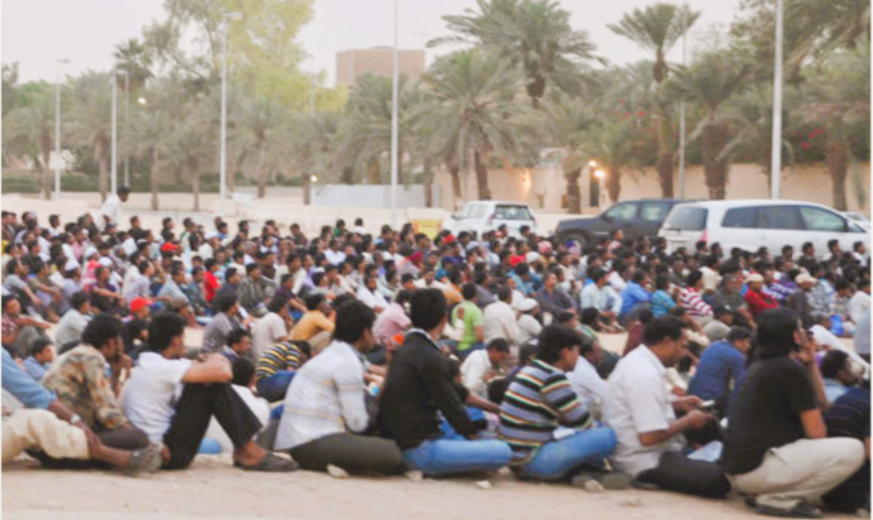Ever wondered why someone might be sent out of Saudi Arabia?
Let me explain it to you.
In Saudi Arabia, there are two main types of deportation punishment and each has its own set of rules and exceptions.
In this simple article, we’ll explore the basics of deportation from Saudi Arabia and understand why it’s an important part of immigration.
Reasons for Deportation from Saudi Arabia
Here are the reasons why someone might face deportation under Saudi Arabia’s new law in 2023:
- Immediate deportation and a 3-year reentry ban for violating Huroob status.
- Direct deportation and a 3-year reentry ban for having an expired Umrah Visa, Visit Visa, or Iqama.
- Deportation with a lifetime ban for immigrants involved in illegal business activities.
- Imprisonment, court proceedings, and subsequent deportation for severe offenses like drug trafficking or murder. (Ban duration varies based on severity.)
- Immediate deportation for any criminal offense, emphasizing the importance of understanding and adhering to Saudi laws.
- Serious consequences for presenting forged identification documents, passports, or visas, to maintain the integrity of the immigration system.
- Deportation for engaging in public indecency, premarital or extramarital relationships, or promoting pornographic content.
- Stricter penalties for individuals previously deported and violating employment bans upon illegal return.
- Potential deportation for any violation of Saudi laws, whether related to traffic offenses, financial crimes, or other illegal activities, to maintain social stability and order.
- Deportation in cases of contagious or infectious diseases, prioritizing public health and safety.
- Deportation for failure to settle unpaid loans, debts, or credit card bills held with banks or companies.
Types of Deportation
Deportation in Saudi Arabia has two categories.
The first is judicial deportation, which is determined by a court.
If you’re an expatriate facing this, you have the option to appeal the decision.
The second type is administrative deportation, which is based on a decision made by the government.
This is usually for expatriates who have committed serious crimes, especially those leading to a prison sentence of three months or longer. (Source: Saudi Gazette)
Exemptions from Judicial Deportation
There are two situations where individuals may avoid judicial deportation:
1. Son or Husband of a Saudi Woman
If the person facing deportation is the son or husband of a Saudi woman, they can be exempted from deportation after making a pledge.
This exemption is applicable unless their conviction falls under Article 112 of the Criminal Procedures Law, which involves a jail term exceeding three months.
However, it’s important to note that a repetition of the crime can lead to deportation.
2. Sentenced to Less Than Three Months
An expatriate can avoid deportation if sentenced to less than three months without any criminal records.
A pledge is taken, and deportation occurs only in case of a repeated offense.
In both cases, expatriates have the right to appeal the deportation verdict or request exemption through regular procedures.
Ban Period After Deportation
As per Article 7 of Saudi Deportation Rules, if you get deported from Saudi Arabia, there’s a ban preventing you from coming back for 5 years.
This ban starts from the day you leave the country.
Who Pays for Deportation?
Now, who foots the bill for deportation?
Well:
- If you’re running away (Huroob), your sponsor pays.
- If you’re working for someone and got into trouble (Huroob), your employer pays.
- If you’re your own boss, you’re on the hook.
- If no one can pay, the government takes care of it.
What is the Deportation Process?

So, if you find yourself in the deportation situation, here’s what you need to do:
- Make sure your passport is good to go.
- Surrender yourself to the Saudi Police.
- They’ll check if you have a criminal record.
- If you’re in the clear, off to the deportation center you go.
- The center checks with your sponsor if they have any beef with you.
- Once your sponsor gives the green light, they set the deportation dates.
- Pay up for your ticket at the deportation center.
- Fly back to your home country.
This info is straight from the Saudi Deportation Law.
Can We Return After Deportation from Saudi Arabia?
If you’ve experienced deportation from Saudi Arabia, there’s a crucial detail to know.
You can’t come back, except for one thing: Hajj and Umrah.
Forget about returning on a work visa; it’s not happening.
The Jawazat’s instructions make it clear: “Deported expatriates can only return for Hajj and Umrah.” (Source: Saudi Gazette)
Also read: Step-by-Step Hajj Guide
In a Nutshell
That’s the deal on why folks might face deportation from Saudi Arabia and what unfolds next.
Whether it’s a visa hiccup or something more serious like breaking the law, Saudi Arabia has its set rules.
Recent tweaks, like exceptions for some deportations and restricted returns, tell us they’re being extra cautious.
It’s a heads-up for all of us in Saudi to be aware of the rules, stick to them, and stay tuned for any changes.
So, keep things running smoothly and feel free to share this information with others.
